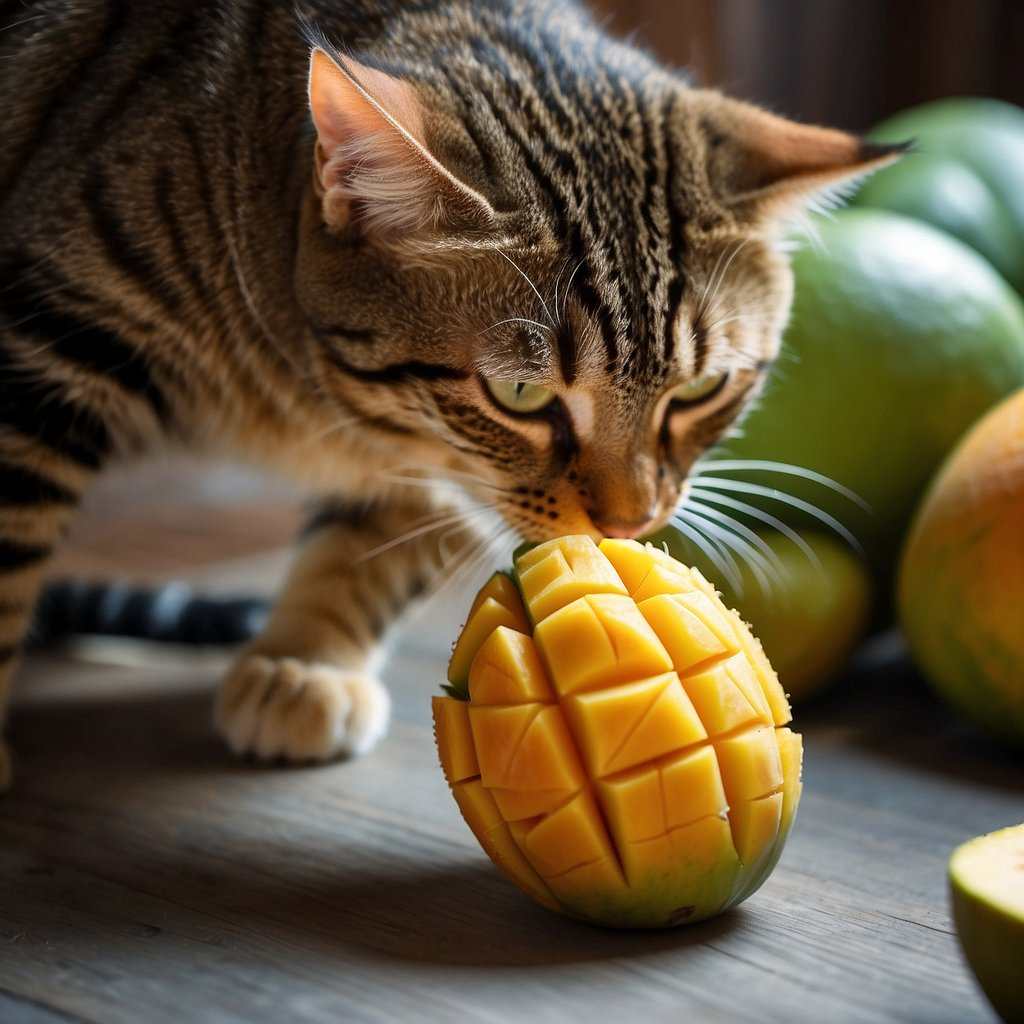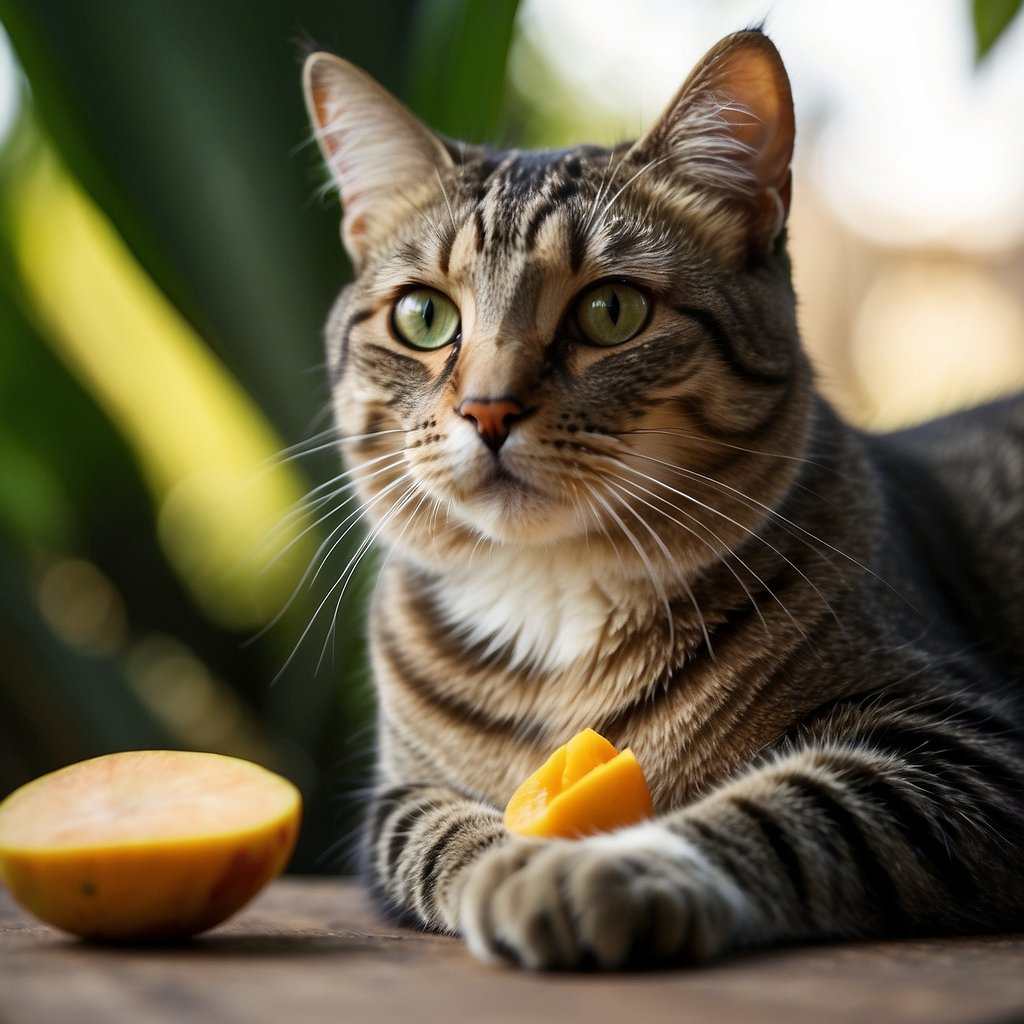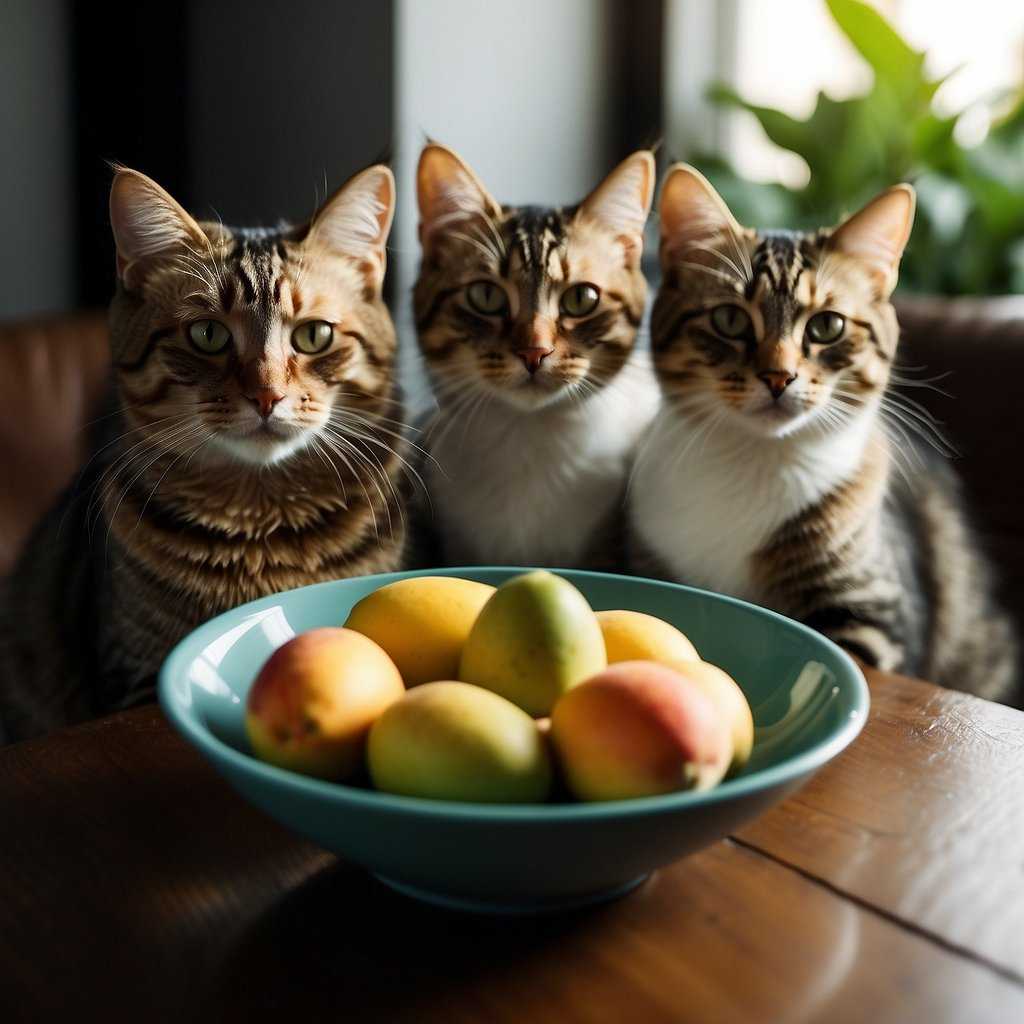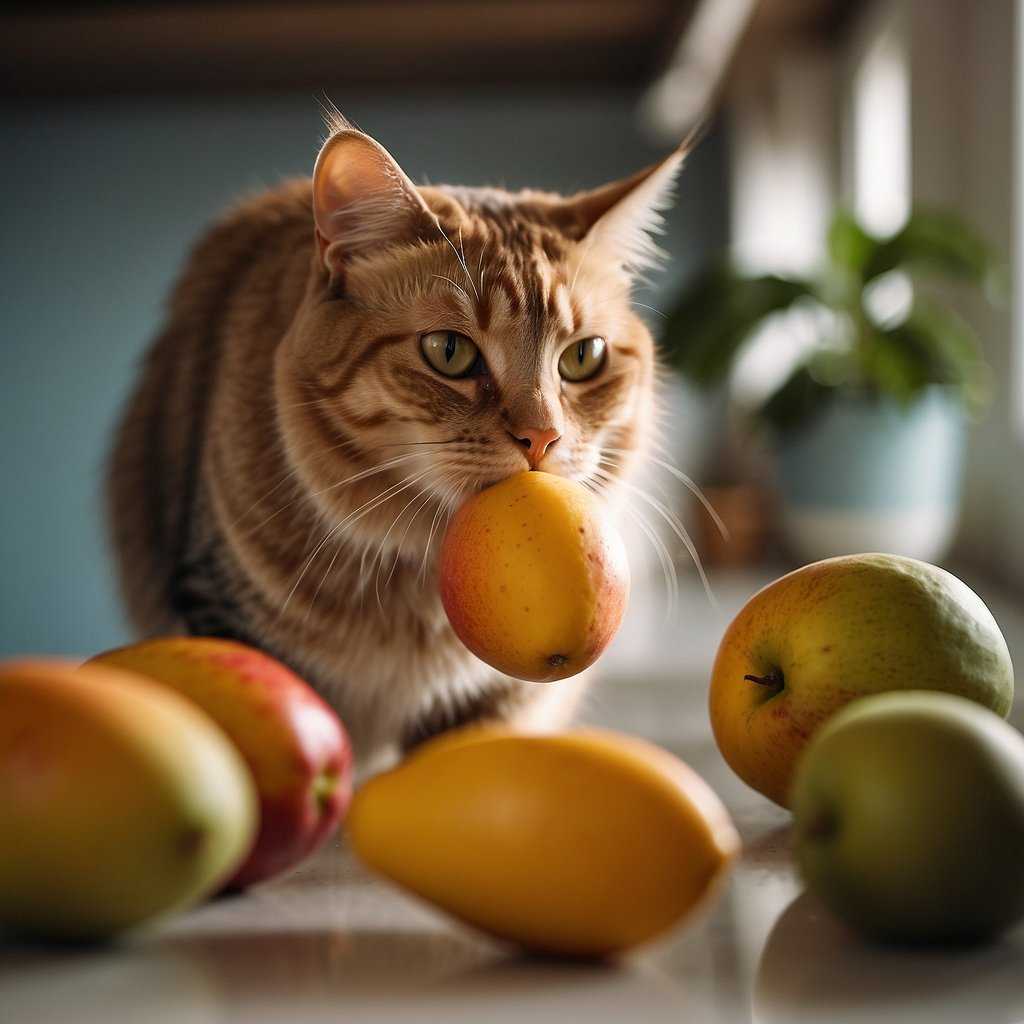Wondering if your feline friend can join you as you indulge in a slice of mango?
As curious as it might seem, mango isn’t off-limits for cats. While cats are obligate carnivores, requiring a meat-based diet to thrive, an occasional mango treat isn’t harmful.
The short answer is: that mango is non-toxic to cats, but the real question is: will they want it? Cats don’t have taste receptors for sweetness, so it should be served in moderation.

However, moderation is key because mangoes are high in sugar and fiber, which are not essential to your cat’s diet and can have adverse effects if consumed in large quantities, including dental issues.
When offering mango to your kitty, it’s important to peel the fruit and remove the pit, as fruit pits can be toxic to cats and could be a choking hazard, to prevent any choking hazards or potential digestive blockages in cat.
Keep in mind that mango is a safe option and should not be a regular feature in your cat’s diet.
A small piece of fresh, peeled mango given as a rare tasty treat is plenty, especially for cats who enjoy the texture and moisture of fresh mango.
Any more than this and the sugar content will be too much for your cat. Remember, cats can’t taste sweet flavors, so they won’t be particularly attracted to mango anyway.
Keep an eye out for any unusual symptoms post-snack, such as vomiting or diarrhea, as these could indicate intolerance or an adverse reaction causing digestive issues.
Key Takeaways
- Cats can eat mango in moderation, and the fruit is non-toxic to them.
- Mango should be served without the pit and skin, and in small quantities due to its high sugar content.
- Monitor your cat for any adverse reactions after consuming mango.
Can Cats Eat Mango?
Have you ever found your furry friend eyeballing that juicy mango on your counter? You’re probably wondering if sharing a slice of this sweet fruit is okay.
Good news—cats can safely enjoy mango in moderation. Mango is non-toxic to cats, so a nibble here and there isn’t going to lead to an emergency vet visit.
Before you turn mango into a regular treat, here’s what you should consider:
- Digestive sensitivity: Despite its safety, some felines might find mangoes hard to digest. Keep portions small. (1)
- Sweetness factor: Curiously, cats don’t have sweet receptors like we do. Though mangoes are delish to us, they may not be as appealing to your cat. (2)
- Nutritional balance: Cats are obligate carnivores. Cats thrive on a diet rich in animal protein, not fruits. (3)
Veterinary insights suggest that fruits like mangoes should be occasional treats rather than diet staples. Why?
Cats benefit most from nutrients found in meats. That said, a small section of mango can give your cat a vitamin boost and offer a hydrating snack. (4)
Are there potential drawbacks? Indeed, here’s what to be watchful for:
- Allergies: Although rare, cats can develop allergic reactions to new foods. If you notice any changes after mango munching, like skin irritation or digestive upset, pause and consult your vet. (5)
- Overindulgence: Too much of a good thing can lead to an upset stomach. Practice restraint and stick to tiny portions. (6)
To sum it up, while a vet might chuckle at the sight of a cat licking a mango slice, their advice remains true—moderation is key.
And remember, always introduce new foods slowly and keep an eye out for any unusual symptoms. Your cat’s health always comes first!
Nutritional Value of Mango in a Cat’s Diet
Have you ever watched your cat eyeing you as you munch on that juicy slice of mango?
You might be tempted to offer a piece to your furry friend, but let’s explore what nutritional value mango holds for your cat.
Vitamins:
- Vitamin A: Essential for cats, but they require a specific form found in animal products. (7)
- Vitamin C: Cats produce their own, making it non-essential from external sources. (8)
- Vitamins B6 and E: Present in mangoes, contribute to nerve function and skin health.
Minerals:
- Mango contains potassium and magnesium, beneficial for muscle and nerve function.
Sugar Content:
- High in mango, which cats don’t need. Felines lack sweet receptors, so the sweet taste is lost on them.
Now, you might be thinking, “But surely, all those vitamins are good for my cat, right?” While that sounds logical, cats are obligate carnivores.
This means the primary source of their nutrition comes from meat, and their bodies are tuned to process nutrients from animal products, not plants or fruits.
For instance, the type of Vitamin A found in mango isn’t in a form cats can easily utilize, unlike the Vitamin A in meat.
Here’s a glance at the numbers:
| Nutrient | In Mango (per 100g) | Cat’s Requirement |
| Vitamin A | 54 IU | 63–125 IU/kg |
| Vitamin C | 36.4 mg | Not required |
| Vitamin B6 | 0.119 mg | 0.4 mg/kg |
| Vitamin E | 0.9 mg | 5.5 IU/kg |
| Sugar | 13.66 g | Minimal |
So, while a bite of mango won’t harm your cat, it’s not a necessary addition to their diet, given their specific nutritional needs.
The limited benefits are overshadowed by the extra sugar, which isn’t ideal for your cat’s health, especially if they’re watching their waistline.
When it comes down to it, remember that moderation is key. A small, peeled piece as an occasional treat? No problem.
Just don’t let those sweet, mango-filled eyes of yours tempt you into making it a feline feast. Keep the meaty meals coming, and everyone will be happy.
Practical Advice on Feeding Mango to Cats
Ever wondered if your purring pal can partake in the pleasure of mangoes? Let’s sink our claws into the juicy details! First thing first: always peel the mango. Those skin bits aren’t a treat for kitty tummies.
Here’s a no-fuss way to prep that tropical delight for your feline:
- Peel the mango to rid of any pesticides and potential irritants.
- Cut it into small chunks that your cat can easily munch on.
Now, are all cats alike when it comes to mango munching? Not quite. For instance, a Maine Coon might gobble up a chunk with gusto, while a Siamese might turn up its whiskers. It’s all about individual taste!
To ensure a happy, healthy kitty, follow these guidelines:
- Frequency: As with any treat, moderation is key! Think of mango as an occasional delicacy rather than a staple—once a week is plenty.
- Serving size: A few small pieces (think pea-sized) will suffice.
Will Fluffy get full-on fruit? Nope! Cats need their regular meaty meals for all those essential nutrients. Mango is just a sunny little bonus.
So, next time you’re nibbling on that scrumptious mango, you know the drill. A tiny treat can make your kitty’s day a bit sweeter—literally!
Just remember, keep it rare, keep it small, and keep it peeled. Happy feeding!
Potential Health Risks and Symptoms to Watch For

Hey there, fellow cat lovers! While it’s fun to share our treats with our feline friends, we must be mindful of their unique dietary needs.
So, before you hand over a slice of that juicy mango, let’s explore the potential health risks and what symptoms could indicate a not-so-purring response from your cat.
It’s always a good idea to keep an eye on your cat after feeding them something new to ensure it’s a good idea.
Symptoms to Watch For:
- Gastrointestinal upset: Watch out for signs like vomiting or diarrhea. Cats have delicate digestive systems, and too much of a good thing can cause trouble.
- Allergic reactions: Rare, yes, but possible. Symptoms may include itching, swelling, or respiratory issues. Keep a close eye on your cat’s skin and breathing.
What if your cat reacts? First, stay calm. Remove any mango and other possible allergens from your cat’s reach. Consult your vet for advice, especially if symptoms persist or seem severe.
UK-Specific Concerns and Regulations: In the UK, pet food regulations is quite strict to ensure our pets’ safety. Remember these rules when considering treats like mango for your kitty.
Treats should only make up a small percentage of their diet to prevent obesity—a growing concern evidenced by more than 50% of cats in the UK being overweight!
What to do next? If your cat enjoys mango without adverse effects, great! But moderation is key. Keep occasional treats small—think tiny, bite-sized pieces.
So, keep a watchful eye, know when to consult your vet, and always prioritize your cat’s health over the novelty of sharing your snacks. Happy and healthy snacking for you and your cat!
Beyond the Diet: Comprehensive Cat Care

Wondering how to ensure optimal health for your furry friend? It goes beyond just filling their bowl. Let’s talk about a balanced diet, the wonders it can do, and broadening our pet care horizons.
What’s on the menu?
We know that cats are obligate carnivores, but they can enjoy a variety too as long as you know your cat’s nutritional need!
Not only is it crucial to provide high-quality meat-based food, but occasionally, a small slice of mango or other non-toxic and cat-safe fruits can add a little fun and provide some useful protein.
But always remember – treats should only make up a tiny part of their diet and should never replace nutritionally balanced, good-quality cat food and meat sources.
Here’s a quick bite of wisdom on nutrition:
- Proteins: The centerpiece of their diet; think chicken, turkey, and fish.
- Fats: Essential for energy, but too much can lead to a chubby kitty.
- Carbohydrates: Less critical for cats, but small amounts add dietary diversity.
- Water: Always ensure a fresh supply to keep them hydrated.
The list above is important for you to remember so that your cat’s nutritional needs are met properly. For Pawrents who like to give large amounts of carbohydrates to their cats, you can stop this habit.
When it comes to broader pet care, there’s a lot under that umbrella. Think regular vet check-ups for those unexpected sneezes, daily play to keep those reflexes sharp, and a cozy nap spot for the best cat naps.
| Pet Care Aspect | Tips |
| Nutrition | Embrace diversity; a treat here, a carrot stick there. |
| Exercise | Laser pointers or feather toys? Yes, please! |
| Hygiene | Litter-box training = Happy cat, happy you. |
| Love | Unlimited cuddles recommended. |
So, you’ve got the gist of it—caring for your cat is a mix of love, proper nutrition, playful exercise, and attentive grooming.
Aim for a happy balance and watch as your cat thrives. Remember, while they may not taste sweet, a small piece of mango can be a fun snack, just keep those portions petite! Now, isn’t that perfect?
Community Engagement and Reader Interaction

Hey there, fellow cat enthusiasts! Have you ever wondered whether your kitty can munch on mangoes without a fuss?
If you’ve tried giving your feline friend a nibble of this tropical fruit or green beans, we’re all ears! Share your tales below—did they turn their nose up, or was it a perfect hit?
Testimonials Table
| Owner’s Name | Cat’s Reaction | Piece Size | Frequency |
| Jane Doe | Loved it! | Small cubes | Once a month |
| John Smith | Ignored it | Thin slice | Once only |
As we’re on this journey together, let’s build a Q&A corner based on your burning questions. Ask away, and who knows? Your query might be the star of our next feature!
Top Reader Questions:
- How much mango is safe for a cat?
- Is the mango pit a no-go for cats?
- Any tips for introducing mango to a picky eater?
Remember, just like us, each cat has its taste—what’s one cat’s treat might be another’s trick. Also, it’s cool to be cautious; we love a good fruit experiment, but keeping those portions teeny-tiny is key.
So, let’s use this spot to swap stories and smarts. Any success with mango as kitty treats or perhaps a lesson learned? Got a photo or a funny reaction video? Go ahead, make our day—drop it below!
And hey, if you’re scrolling through and feeling a bit lost in the meow mix, don’t hesitate to reach out. Whether you’re a seasoned cat caretaker or new to the whisker life, your insights are invaluable.
Plus, you never know who might benefit from your two cents (or should we say, two treats?).
Let’s keep the chat lively and the info flowing. Because after all, this corner of the internet is for you and your purr pals. Dish out the deets, ask your questions, and let’s revel in the cat-tastic community we have here!
(No furry friends were overfed in the making of this conversation!)
Quick Recap

Hey there! Let’s do a quick run-through on whether your purring friend can enjoy that tropical goodness called mango.
First off, mango flesh is a safe treat for cats in small amounts. So don’t worry if they swipe a cube or two—it’s non-toxic!
But remember, moderation is key. Cats have different nutritional needs than humans, and fruits like mangoes definitely shouldn’t be the only fruits cats can eat safely or a large part of their diet.
Why? Too much large amounts of fruits, including mangoes, can lead to a tummy upset.
Also, despite mangoes being packed with vitamins, your furry buddy can’t convert these as efficiently as you do.
There may be toxic aspects of certain fruits that need to be avoided, so mangoes may not provide much nutritional benefit, including their vitamin C, to them either.
However, for humans, mangoes are a great source of vitamin C and should be enjoyed as part of a balanced human food diet.
Have you ever wondered if cats can even taste the sweetness of a mango? Turns out they’re “sweet blind.” They might not appreciate the flavor of fruits like we do, so some simply might not care for mangoes.
Here’s a quick checklist for mango-munching felines:
- Small amounts: Just a cube or two
- Occasional treat: Not a regular diet staple
- Watch for reactions: Any sign of stomach upset? Contact your vet
If you’re contemplating introducing mango or other new foods into your cat’s diet, a chat with your trusted vet is a smart move. They’ll give you the best advice tailored to your cat’s unique health profile.
Curious for more? Want to dive deeper into the world of feline-friendly foods? There’s a wealth of information out there—start with some vet-approved sources or check out reliable pet health websites.
They’ve got all the nitty-gritty details to satisfy your curiosity and keep your cat healthy and happy!
Frequently Asked Questions
Navigating the world of feline-friendly foods can be quite the puzzle, can’t it? When it comes to mangoes, I’ve got the scoop to help you understand what’s a treat and what’s trouble for your purring pal.
Is Mango Safe for All Breeds of Cats?
Absolutely! Regardless of breed, mango is non-toxic to cats. Remember though, like tiny children in a candy store, moderation is key. Their little tummies can’t handle a fruit frenzy!
Can Kittens Eat Mango Safely?
Kittens, those mini mischief-makers, can indeed nibble on mango. But let’s not go overboard – their developing digestive systems are more sensitive, so only a tiny, infrequent treat should be on the menu.
What health benefits does mango offer to my cat, and how much is safe to feed?
Rich in vitamins, mango can offer a nutritional punch for your cat. An occasional, small cube of mango could provide vitamins A and C. Keep it to a minimum; let’s say, a few pieces twice a week to prevent a sugar overload.
How Much Mango Can I Give My Cat?
While a small piece of mango won’t hurt, your feline’s feast should mainly be their regular diet. Think of mango as the cherry on top – pleasing, but certainly not the main course.
What Should I Do If My Cat Has a Bad Reaction to Mango?
Spot any tummy trouble or odd behavior after their tropical taste test? Reach out to your vet. Quick action can keep a minor reaction from turning into a nine-life crisis!
Can Diabetic Cats Eat Mango?
Sugar and diabetes are not pals. So, if your feline friend has diabetes, steer clear of mango. There are plenty of other ways to spoil them without risking their health.
- Advantages of Playing Casino Online - July 6, 2025
- How players can take advantage of the no deposit bonus at the Casino - July 5, 2025


